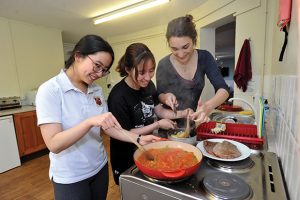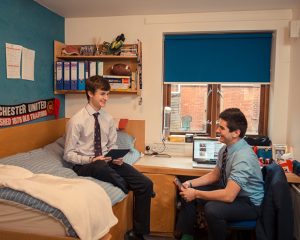Boarding school staff are very experienced at helping students from overseas to settle into life as a boarder
How easy is it for students from overseas to get used to boarding school life? It obviously depends on the student, but is usually hardest for those who have limited English and have not been away from home before. Many boarding schools offer short holiday courses in the spring and summer, often, although not invariably, teaching English language. Students can see what boarding school is like, get used to being away from home, and improve their English all at the same time.
On arrival
Many schools encourage new students from overseas to arrive a couple of days early so that they have time to settle in, make friends and get used to an unfamiliar lifestyle. Each school has its own induction procedure, but students will be shown where everything is, reminded of the most important of the school rules and told who they should go to if they have any problems.
Students whose first language is not English will also be assessed to see whether extra English tuition is needed. If such tuition is necessary, it will be arranged for them and fitted into their timetable. Students will either be taught English on a one-to-one basis or in a small group, depending on their ability and how the school provides additional English language support.
Pastoral care
Boarding school staff are very experienced at looking after and supporting the children in their care. Each student is allocated a tutor who oversees their academic progress, while houseparents (those in charge of the boarding houses where boarders live) are responsible for all other aspects of a boarder’s life, including pastoral care. Some schools have a religious foundation and have faith leaders on site; others with no particular religious affiliations have counsellors and staff experienced at dealing with students’ problems and arrange visits from faith leaders locally.
The students themselves have an important role in pastoral care. Senior students are often involved in organising the welfare of younger pupils, prefects act as role models and mentors, and friends act as a support network for each other. All schools have an anti-bullying policy, and no victimisation is tolerated. Staff understand that it’s perfectly natural for students to become homesick from time to time and do all they can to ensure that students feel happy and settled.
Teaching methods
Students attending a British or international school in their home country will already be familiar with the teaching methods and learning styles in the UK. Such schools often have a high standard of academic achievement, but a more relaxed atmosphere than their counterparts in the UK. Students transferring from these schools to a UK boarding school may find the teaching methods similar, but the lifestyle more formal and structured.
From an early age, pupils in the UK are encouraged to ask questions and express opinions, which may feel strange at first to pupils who come from more traditional educational systems in their home countries. Individual and group tasks, projects, research and enquiry are all important features in the style of learning that your child can expect. The teacher will present information, but will also guide and develop students’ ability to seek out answers for themselves. Independent enquiry is especially important for students joining A-level courses and planning to go to university in the UK.
Students who are not native English speakers need to become competent enough to use English for academic study and will also need to learn subject-specific terminology. Those coming to the UK in order to study for A-levels will not have much time to improve their standard of English during the school term. They are therefore advised to take an intensive summer course specially designed to provide them with English for A-level study before starting at school or college in September. English language courses of various levels are available in the UK and often in students’ own countries.
Food
 UK boarding schools provide a good selection of dishes at each of the three meals a day, and usually cater for vegetarian, halal, kosher and other dietary requirements. In addition, student accommodation has areas where students can prepare snacks and drinks.
UK boarding schools provide a good selection of dishes at each of the three meals a day, and usually cater for vegetarian, halal, kosher and other dietary requirements. In addition, student accommodation has areas where students can prepare snacks and drinks.
The style of cooking may differ from that which students experience in their own country and many pupils enjoy receiving small quantities of their favourite food from home. Although small amounts of many foodstuffs are acceptable for personal use, there are some which may not be sent or brought into the UK. The UK Food Standards Agency website provides information about personal imports. Large quantities may be considered by government customs officials as not for personal use, subjected to checks at the point of import and possibly confiscated or customs duty charged.
Money
Boarding school students should not need very much pocket money, as almost all the entertainment and recreation pupils need is provided as part of the curriculum. Optional extras, such as outings, may be subject to an additional charge, but will be added to the parents’ account. Payment to the school will not usually be requested from a child, although the exact rules vary as the child gets older.
The houseparents keep the pocket money of younger pupils safe in the house bank. At agreed times, students can withdraw some of their pocket money for personal expenses such as shopping. Keeping money in the house bank ensures that it will not be mislaid and prevents students worrying needlessly about security. As well as keeping a strict record of how much money each student has, houseparents also help younger pupils to budget their money.
Older students are advised to open an account with a UK bank and a few schools have branches on site. Online accounts are also becoming more popular. Having their own bank account provides older students with a measure of independence and responsibility and removes the need to keep significant sums of money in their bedrooms.
Staying in touch
It is very easy to keep in touch. Students have access to telephones, and many schools allow students to use Skype to contact family and friends. Schools also provide pupils with their own e-mail address, and letters are collected daily. Most schools permit students to have mobile phones, but have rules about the times when they can be used. To avoid disrupting lessons, some schools forbid mobile phones to be carried in classrooms, lecture theatres and laboratories, etc. Parents may contact houseparents at any time, but should try to avoid waking them in the middle of the night, unless there is an emergency. (The time difference between your country and the UK can be checked here.
 Uniform and personal appearance
Uniform and personal appearance
Most boarding schools have a uniform, which varies from school to school. A detailed list of regulation clothing is provided by the school and forms part of the students’ joining instructions. Parents will be expected to equip students with everything they need, but the school will advise about the best suppliers to use. Students from overseas sometimes have their uniform and equipment delivered direct to the school. Some schools require uniform to be purchased and paid for in advance, while others issue items as necessary and charge for them on the end-of-term bill.
All personal items, including items of clothing, must be labelled with the student’s name to ensure that laundered and/or lost items are returned to the correct owner.
Students usually wear uniform during the working day, and change into casual clothes later in the evening and at weekends. In some boarding schools, uniform for the sixth-formers differs from that lower down the school and in others sixth-formers do not wear uniform at all, but are expected to look smart. Sixth-form and tutorial colleges are unlikely to require uniform.
Boarding schools have strict rules about personal appearance. Schools do not usually allow boys to have long hair, while girls may be expected to tie their hair back during school hours. Discreet jewellery may be permitted, but cosmetics, flamboyant jewellery and unsuitable clothing are not allowed.
Guardians
Every international student at boarding school in the UK must have a guardian who is legally appointed by the student’s parents and who can be responsible for them while in the UK. Boarding schools may have lists of guardianship organisations, but the arrangement is between the parent and the guardian.
The next stage
Boarding schools are an excellent preparation for further study in the UK. School careers departments help students with their university applications and arrange for them to attend university open days. They also arrange for presentations to be given to the school by former pupils to describe life at UK universities.
Joining instructions
Joining instructions will usually include the following:
• A uniform list, informing you what clothes your child should have, and suggesting quantities for each item (eg how many shirts). This list may also include equipment such as a scientific calculator, and details of any sports kit to bring.
• Information about the school shop on the campus or a supplier near the school. Some schools have arrangements for second-hand sales.
• An order form for name tapes. Everything your child brings to school should have their name on it, so you will need to sew the name tapes on every article of clothing, and mark the name on all other property.
• The school calendar, giving the dates of the three terms, half-terms and other events in the academic year.
• Contact information, including telephone numbers and e-mail addresses for the boarding houseparents, plus the numbers for phoning pupils directly.
• A medical form, which will request information about vaccinations, special dietary needs/allergies and other aspects of your child’s health.
• A timetable showing the daily and weekly routine at the school.
• The school’s rules of behaviour and general conduct.
• Information about how often full reports are sent to parents and guardians. This is usually twice a year. In between times, grades are usually given for achievement and effort. There will be a summary of the grade system used, with a brief description of each level and how often they are awarded each term. This will normally be about every three or four weeks.


